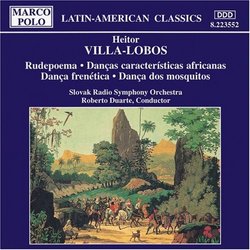| All Artists: Villa-Lobos, Roberto Duarte, Slovak Rso Title: Villa-Lobos: Symphonic Dances (Rudepoema; Dancas caracteristicas africanas; Danca frenetica; Danca dos mosquitos) Members Wishing: 1 Total Copies: 0 Label: Marco Polo Release Date: 7/26/1994 Genre: Classical Styles: Ballets & Dances, Dances, Historical Periods, Modern, 20th, & 21st Century Number of Discs: 1 SwapaCD Credits: 1 UPC: 730099355223 |
Search - Villa-Lobos, Roberto Duarte, Slovak Rso :: Villa-Lobos: Symphonic Dances (Rudepoema; Dancas caracteristicas africanas; Danca frenetica; Danca dos mosquitos)
CD Details |
CD ReviewsMosquito Dance and Rudepoema two oustanding pieces, but I am Discophage | France | 01/21/2008 (5 out of 5 stars) "It was a highly valuable series of four Villa Lobos discs that Roberto Duarte and the Slovak Radio Symphony Orchestra recorded for Marco Polo in the mid 1990s, as they featured compositions from the Brazilian composer that were remarkable not only for the sake of their rarity - no Bachianas Brasileiras and other warhorses here, but instead the composer's highly evocative "Amazonian" pieces (Villa-Lobos: Genesis / Erosao / Amazonas / Dawn in a Tropical Forest), the four suites from his film score "The Discovery of Brazil" (Villa-Lobos: Discovery of Brazil Suites Nos. 1-4), his 6th Symphony and symphonic poem "Rudà, God of Love" (Heitor Villa-Lobos: Symphony No 06, Ruda "God Of Love") - but also, in most cases, for their outstanding musical quality.
"Dança frenética" and the three "Danças caracteriticas africanas" featured on this fourth instalment of the series are early compositions: the first dates from 1919, and the second is the 1953 orchestration of piano pieces written between 1914 and 1916 (the sources differ as to the precise dates, but they can be found in their original garb on Heitor Villa-Lobos: Violin Sonatas and Piano Suites. The composer also arranged them for cello octet in 1916). They are good appetizers, rambunctious, colorfully orchestrated, full of the composer's typical Brazilian rhythms and melodies and exotic touches of percussion, entertaining but not especially profound or illuminating. To our contemporary ears, despite the sneering comment of one critic of the premiere performance that it should be played by epileptic musicians and heard by paranoiacs, Frenetic dance isn't particularly provocative or aggressive either. Stravinsky's Le Sacre, six years earlier, was miles ahead in barbaric power. But the two prizes of this disc are the "Mosquito Dance" and Rudepoema. "Dança dos mosquitos", composed in 1922, is exactly what the title implies - a description in music of mosquitoes. The violins play harmonics in their upper registers, flute-like, with a wonderful and inventive orchestration using the full coloristic resources of the orchestra. It is incredibly evocative, even graphic, immensely fun. If, like me, you suffer mosquito-phobia, it'll send shivers down your spine. But, in purely musical terms, it is also wonderfully inventive. In the end, all's well that end's well: a slow upward glissando of violin solo - the mosquito zeroing in - ends in a big whipping orchestral chord: the strike of the flyswatter. Rudepoema was first written as a piano piece for Artur Rubinstein in 1926, and orchestrated in 1932. In this guise it is a substantial piece (21:30 here) and one of Villa Lobos' most freely rhapsodic and daring orchestral inventions, rambunctious, barbaric, dramatic, often dissonant, almost thorny. An un-groomed Albert Roussel could be an approximation of the impression left by the music. I had enjoyed the same forces' recording of Villa Lobos' "Amazonian" pieces (see my review). There, I found that Duarte's ample tempos, grandeur and lush sound fitted perfectly the compositions' sensuousness and evocative atmosphere, although I remarked that in the faster sections he lacked the drive of Whitney (Villa-Lobos: Erosion; Dawn in a Tropical Forest; Danses Africaines; Bachianas Brasileiras No. 4, otherwise marred by antiquated sonics) or the excellent Montgomery (Villa-Lobos: Orchestral Works). In the case of the present disc, when comparisons are available, the same comments sometimes apply. In the African Dances, comparing the timings of Duarte to those of Mester on the same Louisville disc mentioned above, I first thought that the latter must be cut: 5:55 to 3:35, 6:56 to 4:19 and 5:51 to 3:50, such differences couldn't be only a question of tempo. Well, it is partly the case: in the second and third Dances Mester does apparently practice some cuts. But it is not just that. It is also in a large degree a matter of Duarte's option to go for grandeur rather than dynamism. At times it can exude a certain sensuousness and sweep, but quite frankly, at such pedestrian tempos, I find that the dances do outstay their welcome. Mester's dynamism and drive (and cruder sonics) seems exactly what these pieces require. Under Duarte's baton, they sound somewhat like the dances of the African elephants, and his lazy tempos put you almost in the sound-world of Gershwin rather than of Villa Lobos. He should have taken his lead from the title of the first piece featured on the disc: "frenetic". That said, in the "Frenetic Dance", Duarte is no less frenetic than Montgomery, even slightly more. So it is not that he is incapable of forward motion and energy. In the two other pieces, I have no comparison to enable me to assess the interpretive merits of Duarte - as these appear to be the only recordings of the orchestral version of Rudepoema and of the Mosquito Dance. But these two pieces are so wonderful that I don't care if Duarte may not be their ideal servant: this hasn't hampered my enjoyment in the least. " |


 Track Listings (6) - Disc #1
Track Listings (6) - Disc #1